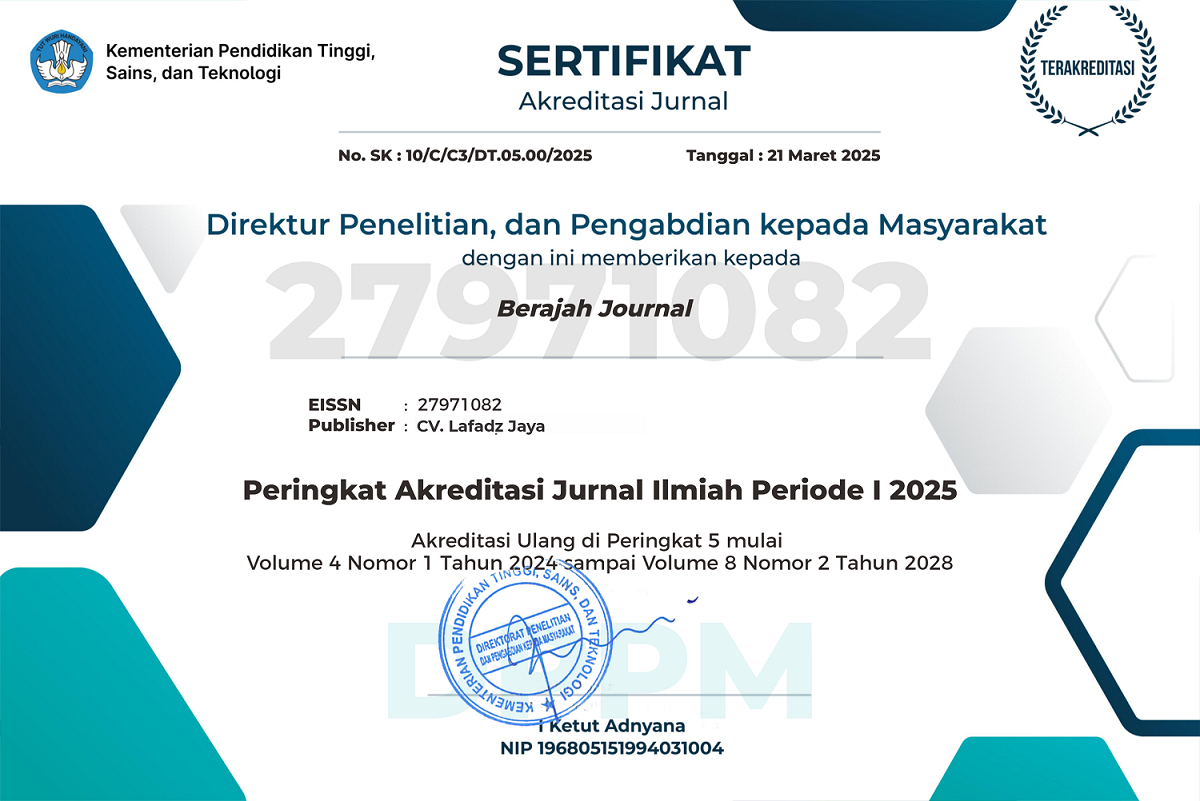PENGARUH DAYA SAING, BUDAYA KEUANGAN, DAN KEPUTUSAN PEMBAYARAN KREDIT TERHADAP AKSES KEUANGAN
DOI:
https://doi.org/10.47353/bj.v4i7.461Keywords:
Competitiveness, Financial Culture, Credit Payment Decisions, Financial AccessAbstract
The background to the problem in this research is that access to finance is still an obstacle for SMEs to grow. Seeing this condition, the OJK has established regulations related to online financing for SMEs (equity crowdfunding) which is currently booming in the financial world. This research aims to determine the influence of competitiveness, financial culture, and credit payment decisions on financial access. This research uses a quantitative approach. The research results show that access to financial services is an important feature in SME business operations. Different from large companies, SMEs show personalization because their development depends on entrepreneurs who are also owners and founders. This personalization effect causes banks to doubt their behavior in repayment of credit taken. The results of this research show that SMEs' access to finance is influenced by competitiveness factors, financial culture, and credit payment decisions. These findings provide literacy in the financial sector related to SMEs' accessibility to financing and credit payment decisions, competitiveness, and financial culture. It can be concluded that capacity (competitiveness and culture) and willingness (decision) to repay loans determine the accessibility of SMEs to financing. However, on the other hand, SMEs still complain about the difficulty of their access to financing in conventional financial institutions. In fact, this injection of external funds can be used by SMEs to develop their businesses and expand their markets.
Downloads
References
Adomako, S., Danso, A., & Damoah, J. O. (2015). The Moderating Influence of Financial Literacy on The Relationship Between Access to Finance and Firm Growth in Ghana. Venture Capital, 18(1), 43–61. https://doi.org/10.1080/13691066.2015.1079952
Ahiawodzi, A. K., & Adade, T. C. (2012). Access to Credit and Growth of Small and Medium Scale Enterprise in the Ho Municipality of Ghana. British Journal of Economics, Finance and Management Sciences, 6(2), 34–51.
Ahmedova, S. (2015). Factors for Increasing the Competitiveness of Small and Medium- Sized Enterprises (SMEs) in Bulgaria. Procedia - Social and Behavioral Sciences, 195, 1104–1112. https://doi.org/10.1016/j.sbspro.2015.06.155
Arenius, P., & Autio, E. (2006). Financing of Small Businesses: Are Mars and Venus More Alike than Different? Venture Capital, 8(2), 93–107. https://doi.org/10.1080/13691060500433793
Arifudin, O. (2020). PKM Pembuatan Kemasan, Peningkatan Produksi Dan Perluasan Pemasaran Keripik Singkong Di Subang Jawa Barat. INTEGRITAS : Jurnal Pengabdian, 4(1), 21–36.
Arifudin, O. (2022). Teacher Personality Competence In Building The Character Of Students. International Journal of Education and Digital Learning (IJEDL), 1(1), 5–12. https://doi.org/https://doi.org/10.47353/ijedl.v1i1.3
Arifudin, O. (2021). Pengaruh Kelas Sosial, Pengalaman dan Gaya Hidup terhadap Perilaku Penggunaan Kartu Kredit. Jurnal Ilmiah MEA (Manajemen, Ekonomi, & Akuntansi), 5(1), 286–298.
Bairizki, A. (2021). Manajemen Perubahan. Bandung : Widina Bhakti Persada.
Demirgüç-Kunt, A., Honohan, P., & Beck, T. (2008). Finance for All: Policies and Pitfalls in Expanding Access. The World Bank
Febrianty, F. (2020). Kepemimpinan & Prilaku Organisasi Konsep Dan Perkembangan. Bandung: Widina Bhakti Persada.
Ghozali, I., & Latan, H. (2015). Partial Least Squares : Konsep, Teknik dan Aplikasi Menggunakan Program SmartPLS 3.0 (2nd ed.). Badan Penerbit Universitas Diponegoro.
Ismanto, H., & Diman, T. (2014). Analisis Efektivitas Pemberian Pinjaman Program Pembiayaan UMKM oleh Koperasi. Jurnal Economia, 10(2), 148–164. https://doi.org/10.21831/economia.v10i2.7541
Machmud, Z., & Huda, A. (2011). SMEs’ Access to Finance: An Indonesia Case Study. In ERIA Research Project Report 2010 14, 261–290.
Mertzanis, C. (2017). Marketing Financial Services and Products in Different Cultural Environments. In Information Resources Management Association (Ed.), Risk and Contingency Management: Breakthroughs in Research and Practice: Breakthroughs in Research and Practice, 134–160.
Nasem, N. (2018). Pengaruh Pelatihan dan Motivasi terhadap Produktivitas Kerja Tenaga Kependidikan Stit Rakeyan Santang Karawang. Jurnal Manajemen, Ekonomi Dan Akuntansi, 2(3), 209–218.
Paturochman, I. R. (2024). Pluralism And Multiculturalizm Education. International Journal Of Society Reviews, 2(3), 564–573.
Shavab, F. A. (2021). Dasar Manajemen & Kewirausahaan (Sebuah Tinjauan Teori Dan Praktis). Bandung: Widina Bhakti Persada.
Siddiqui, M. A. (2017). The Effects of Entrepreneurs Characteristics on Loan Repayment Behaviour of MSMEs. Journal of Management and Technology, 13(2), 16–21.
Tanjung, R. (2020). Analisis Pengaruh Penilaian Kinerja Dan Kompensasi Terhadap Produktivitas Kerja Pada PDAM Kabupaten Karawang. Jurnal Ilmu Manajemen, 10(1), 71–80. https://doi.org/https://doi.org/10.32502/jimn.v10i1.2719
Venturelli, V. (2008). Access to Finance of Innovative SMEs. In Bridging the Equity Gap for Innovative SMEs (pp. 17–28). Palgrave Macmillan.
Wang, W. (2012). How The Small and Medium-Sized Enterprises’ Owners’ Credit Features Affect The Enterprises’credit Default Behavior? E3 Journal of Business Management and Economics, 3(2), 090–095.
Zsótér, B. (2018). The Aspects of Financial Culture Among Young Adults. Ekonomske Ideje iPraksa, 30, 51–71.
Downloads
Published
How to Cite
Issue
Section
License
Copyright (c) 2024 Ernie Soedarwati, Rahmawaty Arifiani

This work is licensed under a Creative Commons Attribution 4.0 International License.






















